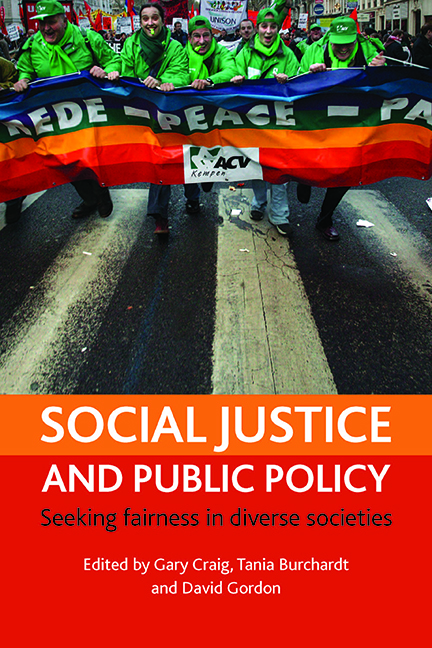Book contents
- Frontmatter
- Dedication
- Contents
- Acknowledgements
- Notes on contributors
- Introduction
- one Social justice and public policy: a view from political philosophy
- two Social justice and public policy: a social policy perspective
- three Multiculturalism, social justice and the welfare state
- four Structural injustice and the politics of difference
- five Recognition and voice: the challenge for social justice
- six Globalisation, social justice and the politics of aid
- seven Social justice and the family
- eight Children, policy and social justice
- nine Social justice in the UK: one route or four?
- ten Monitoring inequality: putting the capability approach to work
- eleven The limits of compromise? Social justice, ‘race’ and multiculturalism
- twelve Understanding environmental justice: making the connection between sustainable development and social justice
six - Globalisation, social justice and the politics of aid
Published online by Cambridge University Press: 19 January 2022
- Frontmatter
- Dedication
- Contents
- Acknowledgements
- Notes on contributors
- Introduction
- one Social justice and public policy: a view from political philosophy
- two Social justice and public policy: a social policy perspective
- three Multiculturalism, social justice and the welfare state
- four Structural injustice and the politics of difference
- five Recognition and voice: the challenge for social justice
- six Globalisation, social justice and the politics of aid
- seven Social justice and the family
- eight Children, policy and social justice
- nine Social justice in the UK: one route or four?
- ten Monitoring inequality: putting the capability approach to work
- eleven The limits of compromise? Social justice, ‘race’ and multiculturalism
- twelve Understanding environmental justice: making the connection between sustainable development and social justice
Summary
Introduction
One of most important recent developments in theorising about social justice has concerned the extension of the conception of justice developed by Rawls in A theory of justice (1999a) to the global arena. In what follows I review some of this discussion and suggest that cosmopolitan critics are right, against Rawls himself, to suggest that we should treat the world as a whole (or at least the global economic system as a whole) as being in principle subject to evaluation according to a single distributive standard. But while that standard can be extended beyond the borders of nations to the wider arena of cooperation, the key mechanism that Rawls relied on to do the distributive work, the design and selection of an institutional structure, is not available to us in the same way as it is for the domestic sphere. It exists in one sense (there is a global basic structure that does much to explain distributive outcomes) but we cannot exercise very much control over it and could not reliably predict the effects of doing so if we could. We are therefore forced both to look more directly at social outcomes and at measures to change them after the event, and also to seek not the full achievement of social justice on a global scale but rather the avoidance of the most serious harms and injustices.
For and against cosmopolitanism: beyond the self-contained Society
Rawls's original restriction of focus to a self-contained society, although made for methodological simplicity, had the important limitation of not corresponding to the world in which we live. No society is really self-contained: all societies engage in trade across borders and all permit, to varying degrees, the immigration of outsiders and the emigration of citizens. In addition, societies interact in other ways: through cultural contact, environmental effects, war, participation in global institutions of various kinds and so on. Indeed, we live in a world in which societies are less self-contained than at any time in history. The simplest of objects that a person consumes – a cup of tea for example – will have been produced by a process involving the cooperation of thousands of people in activities including mining, agriculture, transport and fuel production.
- Type
- Chapter
- Information
- Social Justice and Public PolicySeeking Fairness in Diverse Societies, pp. 123 - 138Publisher: Bristol University PressPrint publication year: 2008



